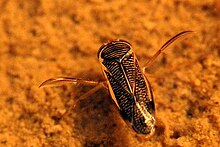Corixoidea
| Corixidae | |
|---|---|
 |
|
| Hesperocorixa castanea | |
| Scientific classification | |
| Kingdom: | Animalia |
| Phylum: | Arthropoda |
| Class: | Insecta |
| Order: | Hemiptera |
| Suborder: | Heteroptera |
| Infraorder: | Nepomorpha |
| Family: |
Corixidae Leach, 1815 |
| Subfamilies, Genera | |
|
33 genera in 6 subfamilies |
|
33 genera in 6 subfamilies
Corixidae is a family of aquatic insects in the order Hemiptera that inhabit ponds and slow-moving streams, where they swim near the bottom. There are about 500 known species worldwide, in 33 genera, including the genus Sigara.
Members of the Corixidae are known in the United States as , a term that is sometimes used in the United Kingdom for Notonecta glauca, an insect of a different family, Notonectidae, and Corixa punctata is the "lesser water boatman".
Corixidae generally have a long flattened body up to 13 millimetres (0.5 in) long and have extremely fine dark brown or black striations marking the wings. They have four long rear legs and two short front ones. The hind legs are covered with hairs and shaped like oars, hence the name "water boatman". Their four hindmost legs have scoop- or oar-shaped tarsi to aid swimming. They also have a triangular head with short, triangular mouthparts. Corixidae dwell in slow rivers and ponds, as well as some household pools.
Unlike their relatives the backswimmers, who swim upside down near the surface of the water, Corixidae swim right side up near the bottom of ponds or streams. It is easy to tell the two types of insects apart simply by looking at where the insect is in the water and whether it is swimming upside down.
Corixidae are unusual among the aquatic Hemiptera in that they are mostly non-predatory, feeding on aquatic plants and algae instead of insects and vertebrates. They use their straw-like mouthparts to inject enzymes into plants. The enzymes digest the plant material, letting the insect suck the liquified food back through its mouthparts and into its digestive tract. A few species of Corixidae are predatory, but the majority are herbivorous.
Some species within this family are preyed upon by a number of amphibians including the rough-skinned newt, Taricha granulosa.
The reproductive cycle of Corixidae is annual. Eggs are typically oviposited (deposited) on submerged plants, sticks, or rocks. In substrate limited waters (waters without many submerged oviposition sites), every bit of available substrate will be covered in eggs.
...
Wikipedia
